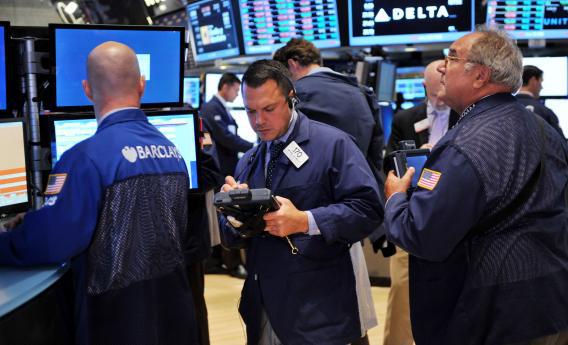Corporate profits and business investment are supposed to be very closely linked. On the one hand, profits can fund investment. On the other hand, the existence of profits ought to attract investment to exploit profit opportunities. And that investment should do two things—create jobs and generate more capital goods and both full employment and capital deepening lead to higher wages.
But recently the relationship seems to have broken down and Robin Harding has a great exploration of the issue in the Financial Times. Ask a business executive these days about why investment levels are depressed and he’s likely to say that cash is “on the sidelines” and will stay there until the government adopts:
- a) Regulations that are friendlier to his company’s interests.
- b) Corporate income tax policies that are friendlier to his company’s interests.
- c) Individual income tax policies that are friendlier to his personal interests.
As Harding points out, this makes very little sense. The means by which business-hostile public policy might depress investment is by depressing profits. The question is why investment is low relative to profits. And Harding suggests that “Corporate Investment and Stock Market Listing: A Puzzle?” by Alexander Ljungqvist, Joan Farre-Mensa, and John Asker providers the answer:
We document sizeable and surprising differences in investment behavior between stock market listed and privately held firms in the U.S. using a rich new data source on private firms. Listed firms invest substantially less and are less responsive to changes in investment opportunities compared to matched private firms, even during the recent financial crisis. These differences do not reflect observable economic differences between public and private firms (such as lifecycle differences) and instead appear to be driven by a propensity for public firms to suffer greater agency costs. Evidence showing that investment behavior diverges most strongly in industries in which stock prices are particularly sensitive to current earnings suggests public firms may suffer from managerial myopia.
On this account we are reaping the bitter fruits of the “shareholder value” revolution. Executives at publicly traded companies are paid to generate higher share prices, which is done by hitting quarterly earnings targets. This leads to underinvestment relative to the behavior of managers of privately held firms. Not because managers of private firms are indifferent to the interests of shareholders, but because there’s less need for creating the shareholder value link via a simplistic relationship between compensation, share price, and quarterly earnings. One way to think about Amazon’s anomalous (and admirable) behavior is that despite being a publicly traded company, it actually functions much more like a closely held private one. Jeff Bezos has a whole thing about his philosophy of leading for the long-term. Not coincidentally, Bezos doesn’t get paid very much for a CEO—less than $2 million in executive compensation—but he’s rich because he owns almost 87 million shares of Amazon stock. His long-term prosperity is the long-term prosperity of the company and he has the confidence of Wall Street in pursuing his investment-heavy, profit-light strategy.
But the bulk of America’s large companies aren’t like that, and we all suffer as a result.
